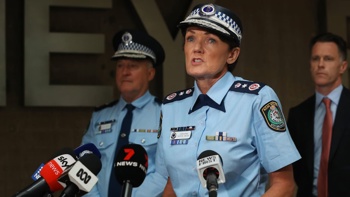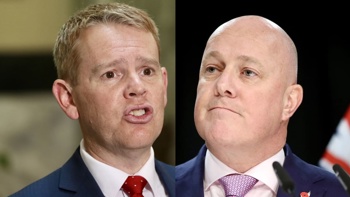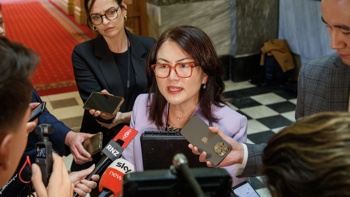
Despite the health workforce crisis, government health officials have given short shrift to an unprecedented proposal to double the numbers of specialised nurses who can cover for a shortfall of GPs.
RNZ can reveal all the schools of nursing have joined forces on a proposal submitted in May aiming to double the number of nurse practitioners being trained.
But they have just had a Ministry of Health letter back saying the status quo will continue - a response they are calling a "huge disappointment".
Their proposal sent to the new chief executive of Health NZ, Fepulea'i Margie Apa, was for more funding, more evenly spread across more standardised training, starting urgently next year, aimed at doubling the number of nurse practitioners entering the workforce to about 200 a year.
A Wainuiomata GP clinic manager says that would be "amazing".
Nurse practitioners were "very hard to get" and officials "really need to support that proposal," said Keriana Kingi of Wainuiomata's Whai Oranga o Te Iwi Health centre.
"It would be awesome."
Some GPs are seeing 40 patients a day and working up to 70 hours a week, and about half the country's clinics have stopped taking on any new patients.
/cloudfront-ap-southeast-2.images.arcpublishing.com/nzme/GI44TOBTDN7AZNXMM6KEBVOJWM.jpg)
Dr Bryan Betty. Photo / RNZ / Karen Brown
The pressure has been ratcheting up for months, regardless of workforce strategising going on at the Ministry of Health for a decade.
In March the heads of all nine nursing schools agreed it was "essential" to put their usual institutional competitiveness aside to find a shared solution.
Massey Prof Jenny Carryer then wrote up their proposal. "The role of nurse practitioner is the solution to the disappearing GP workforce which has been hiding in plain sight for 20 years," she told RNZ.
Carryer, executive director of the College of Nurses, said it was "absolutely" unprecedented for the schools to join forces this way.
Their proposal sought official support for increasing funding so that trainees don't have to pay their own way, as almost half of them do now. Trainees would also all get 500 clinical hours instead of some getting just 300; the five universities would co-ordinate better with the polytechs; more Māori and Pasifika would get trained - and that ultimately more practitioners would graduate.
Their six-page letter argues this would cost a lot less and be much quicker than trying to train up more GPs.
The ministry's two-page response does not address the proposal directly at all, saying rather that "critical shortfalls in the [sector] workforce" will be worked on over the next two years.
"We will ensure the College of Nurses be included in the strategic and planning work that will occur once the new entities are established," the ministry's chief nursing officer Lorraine Hetaraka and Acting Deputy Director-General Andrew Wilson wrote.
The response said existing funding would continue - a "huge disappointment" said Carryer, though not unexpected.
"The letter outlined a number of high-level goals that the health sector has ... many of which nurse practitioners would absolutely deliver on," Carryer said.
"I think that was the thing I found most ironic."
The nursing schools would regroup and try again, she said.
The College of GPs said the barrier to the proposal appeared to be the enduring lack of a national health workforce strategy.
"There's small pieces of work going on but we don't have an overarching strategy across general practice, specialist conditions and things like nurse practitioners, and I think that's the critical issue," college medical director Dr Bryan Betty said.
The government, prime minister and Health Minister Andrew Little have all in recent weeks stressed they are working on reducing the impacts of health workforce shortages.
There are about 600 locally trained nurse practitioners.
Keriana Kingi finally found one to employ five months ago, without in the end having to resort to looking overseas - which is where all her clinic's GPs come from.
"They're hard, hard to get but she's able to do a whole lot of stuff ... just about as much as a GP and probably a bit more easily accessible because she's a New Zealander," Kingi said.
"You know, we've got so many nurses that are brilliant and can do more.
"If they could access that training more and come out as primary care nurse practitioners, it would be amazing long-term."
The College of GPs said it was in talks with Health NZ about the workforce - and Carryer speculated what might happen if the GPs used those talks to weigh in behind the nurse practitioner proposal.
"That would be an incredibly powerful move and I would be hugely impressed, if the College of GPs would understand the degree to which people are missing out, and we worked together to use our combined power and knowledge," she said.
"That would be very effective."
Asked if GPs might back the proposal, Betty said:
"We haven't seen the proposal directly - any moves to start to increase the workforce and the delivery of community healthcare is welcome.
"Absolutely there is a need for increased workforce and nurse practitioners, nursing general practitioners and specialists across the board. So absolutely, steps that are taken to address the shortage ... is absolutely necessary."
Take your Radio, Podcasts and Music with you









